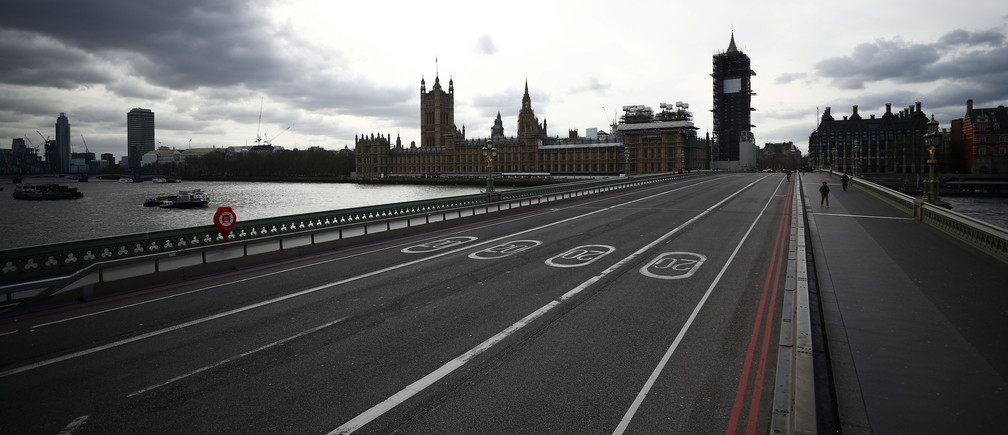Global carbon dioxide co2 emissions may fall over 5% this year, with several countries imposing lockdowns to stop the spread of coronavirus, scientists have said. This will be the biggest drop since World War II, according to the Global Carbon Project, a network of scientists providing benchmark emissions data. Scientists have warned that without lasting structural changes, the emissions will bounce back to where they were.
They point out that the fall is for all the wrong reasons: Over 1,15,000 people have died because of the pandemic, factories are closed, airlines are grounded, power demand has plummeted, millions of people have lost jobs. Experts said global emissions would need to fall by over 6% annually till 2030 – more than 2,200 MtCO2 per year – to limit warming to less than 1.5°C above pre-industrial temperatures, which can only be achieved from structural changes.
Jalandhar AQI at pristine 52, offers rare view of the Himalayas in decades
Three weeks of lockdown in India has cleaned the air enough for people to witness for the first time in decades a view of the Himalayas from their houses. The snow peaks of Dhauladhar mountains, part of Himalayan range, surprised the residents of Jalandhar last week who posted pictures on social media. Air quality Index of the district, about 100 miles from the Himalayas, recorded at 52 micrograms per cubic meter last week, the best over the past decade, a Punjab Pollution Control Board (PPCB) official said.
Before the lockdown, the district’s average daily AQI reading was between 120 and 140. Mandi Gobindgarh, the steel city of Punjab, the AQI averaged 117 before the lockdown and it dropped to 42 during the lockdown period, improving the air quality by 64%. The PPCB officials said the Respirable Suspended Particulate Matter (RSPM) had dropped to 50 micrograms per cubic metre in March; this was 188 micrograms per cubic metre, on average in 2019; 162.5 in 2018; 172 in 2017 and 197 in 2016, HT reported.
Global daily tracker of PM levels warns of major economic slump
Particulate matter (PM) levels dropped 6.8% on April 1 in India since the lockdown was imposed to stop the spread of coronavirus, but the fall began in January, much before the lockdown – that’s the conclusion of the scientists of the Energy Policy Institute of the University of Chicago (EPIC). EPIC tracks both electricity consumption and PM levels every day from government and non-government sources in the US, European Union, China and India. The scientists used daily electricity data for India from Power System Operation Corporation Limited’s daily reports and PM 2.5 data from OpenAQ, a website that aggregates particulate matter readings from monitoring stations around the world.
According to the EPIC tracker, the fall in power consumption because of coronavirus lockdown in these countries resulted in a 6% dip in PM pollution on April 1 compared to December 2019 in these countries. The data shows a 3.37% dip in power consumption in the US, European Union, China and India combined on February 29, relative to the average electricity consumption in December 2019.
With few buyers, automakers slash prices of cleaner BS6 fuel vehicles close to dirtier BS4 fuel vehicles
Automakers were finding it tough to sell cars and bikes before the COVID-19 outbreak, but post the lockdown they have been forced to sell even the new and cleaner BS6 compliant fuel vehicles closer to the price of the older BS4 vehicles they are meant to replace. The pandemic has worsened the auto sector’s troubles in the midst of transitioning to stricter emission norms from April 1.
In the absence of buyers, Toyota has decided to cut the price of BS6 vehicles almost by 50%: their diesel vehicle that was priced at the hiked BS6 price of ₹1.5 lakh is now on the offer for ₹80,000, while the company absorbs the remaining ₹70,000 itself. Dealers told ETAuto that Mahindra, India’s largest utility vehicle maker, did the same even with the fast selling XUV300, which was priced close to the BS4 prices.
Study: Short-term exposure to toxic air impacts gene behaviour, risks cancer, heart diseases
New data from a research study by Monash University researchers in Australia says even short-term exposure to low level air pollution can affect gene expression, leaving people at risk of diseases such as cancer, cardiovascular and respiratory diseases. The study is published in the journal Environmental International.
The researchers studied blood samples from 266 pairs of twins (192 identical and 74 non identical) as well as 165 parents in Brisbane over periods from 2005 to 2010. The periods when the blood samples were taken were matched to data from seven air quality monitoring stations around Brisbane at that time, to measure exposure to PM2.5, and sulphur dioxide.
The researchers studied expression in six genes associated with oxidative stress and inflammation, long considered important features of disease processes initiated by pollutants.
About The Author
You may also like
Meat, dairy industry surpasses fossil fuels in methane emissions: Report
Delhi-NCR most polluted region in India, Karnataka the cleanest air in India: Report
Outdoor air quality chronically underfunded, finds State of Global Air report
PM2.5 shortening average life expectancy of Delhi residents by almost 12 years
PM 2.5 air pollution increases anti-biotic resistance globally, India risk increases 2.5%


